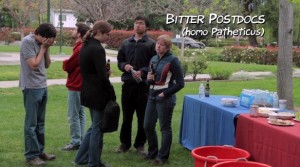The feelings and thoughts about lost times, years never to recuperate – those mental pains are some of the tortures that regularly accompany the living.
I distinctly remember one of my first years of graduate school. We grad student representatives, dressed in our khaki pants and ugly university t-shirts, had hosted a party for the incoming grad students inside a small and dirty, multi-use student lounge. The grad students had to show their flimsy identification cards in order to enter, while ‘the party’ featured stale bread, Wal-Mart cheese plates and super cheap wine.
All types of grad students entered the premises. I saw haggard women in their sixties just getting degrees for the sake of degrees and loud mouth kids barely out of their undergraduate studies who embarrassingly got drunk like they were at a frat party. There were also lots of rich foreign kids from China, India and other Asian countries, and some really peculiar specimens representing the melancholic diversity of human misery entered at the door.
I spotted a small, balding homeless man with dirty clothes. His physical, facial profile resembled a cross between a hallucinating mental patient and a twisted pigeon that one finds crapping off urban ledges. He did not talk and let off weird noises and grunts as he devoured the cheap cheese and dip snacks. I spotted another forty something male, wearing all black clothes. He was large, fat, had bad acne, a dirty black pony tail, and he smelled funny. The man just sat alone and was talking to himself, nursing his plastic glass of cheap wine, and then he would suddenly break out in a cackle to himself every once in a while.
As I was chatting up some foreign grad student women, a young man in his mid twenties with smeared food on his chin, suddenly interrupted our conversation and began droning his words at us. He wore glasses, had brown hair with white specs in it, and his speaking rhythm was quite slow. I felt terribly sorry for the rude chap even though he interrupted our conversation. After talking at us about some innocuous subject, he then straightaway said his good byes and left us.
I later became a madman too. I continued in graduate school for five more years, torturing my mind relentlessly, until finally receiving my very own, funny doctoral papers.
After receiving that ‘degree,’ I needed three more years of post-graduate school detox in order to mentally break free. It was no coincidence that I moved into Death Studies, Thanatology, towards my last years of doctoral studies.
For years after receiving my PhD, the doctoral useless degree in history – or whatever history or the humanities, I nourished a harsh mental concoction of both betrayal and anger.
I wasted six years of life involved in such a struggle – all to receive the highest degree possible. My doctoral degree has also become the unending curse of my recurring unemployment. The lucky ones escaped early before their torturous exams and thesis dissertations. They became bartenders and a few even made some real money – unlike me.
Nor do I have any friends from my long graduate school period – and I was not the only grad student to experience this. I stayed on because I thought that I needed a doctoral degree in history in order to become a historian. I now know that I was wrong.
This essay is for those historians of heart and soul who want to know the truth in order to become true historians. Historians free from the American graduate school curse.
This essay will explain the mystery in becoming a historian without having to endure the fetid dumpster of graduate school. The free-spirited historian has to go through ten levels or historical exercises, also called ‘the method,’ before reaching the historian peak. Anyone with a love of history, curiosity and basic intelligence can do it.
The first skill embraces simple freedom. For the historian, he or she completely rejects the graduate school scam and the lowlifes that congregate in such spaces, which also includes the professors and administrators. I use the word lowlife because most grad students are not your typical hard-working and talented subset of workers and artists. They are exactly the opposite.
Most graduate pupils are weird, petty, pathetic and extremely annoying. Many grad students are incapable workers and cowardly misfits that cannot hold positions in the real world of labor and suffering. For them, grad school is a safe option where they can do meaningless work on the government’s dollars, or in the case of the private universities, on the scholarship of a rich benefactor with dementia.
They soon ‘work’ with their tenured professor advisers that both love and hate them. The professors are just as cowardly as the grad students, which explains the love and hate dynamic between them both. Meanwhile, the university administrators break into vicious smiles. They are the real ‘brains’ behind this degrading university industrial complex.
Grad teacher pay is terribly low and the university admins just adore them. This is because the administrators can pay slave wages to a bunch of spineless graders that will pour through hundreds of college student papers without one word of complaint. Every succeeding academic year, a new crop of academic screwballs enters the academy for more self-abuse. The supply is endless, and the administrators know this.
The university scammed me brutally, and all I received was a piece of paper giving me the pathetic title of ‘doctor.’ Yes, I am a doctor, but for being so intelligent, I was also quite stupid in sacrificing six good years of my youth for such nonsense.
Imagine having to endure six hard years of such abuse for collecting a simple piece of paper. Very few grad students can successfully charter the American university cesspool, while guarding both their integrity and dignity in the strong box. Most graduate student drifters entered the college halls as sublime losers, and they will leave grad school as academic wackos. This terrible, cruel world of demeaning experiences is no place for the art of history. History has nothing to do with such horrors. Just stay away.
The real, actual and true historian can birth him or herself through reading lots of books and visiting libraries, archives and museum collections. This represents the second level and the Method: a love for reading and writing. This method does not mean the despicable skill of ‘academic writing,’ which is the best sleeping pill around. The method embraces all types of writing: poetry, prose, essays, letters, theater, cinema, song and installation art.
This love of books and writing leads into the third level for a historian: a curiosity about some past culture. The historian might have an interest in the lives of Roman imperial soldiers, or the sexual mores of the French Renaissance. The diversity of the world is completely open to all interested parties.
The historian needs to see what the encyclopedias say about the Roman military or French social customs during the 1500s. With this general information, the historian now has linked terms related to a particular study, such as Roman campaigns, martial poetry, French marriage customs, and French gender relations in the early modern period.
The fourth level is when she or he types the links on scholar.google.com or Academia.edu and can then see some of the recent historical monographs, (books), or articles on the topics. The budding historian can save those linked works, download copies perhaps, and he or she now has a working bibliography of secondary sources, or books and articles on the original topics.
Now one has to read the different articles and books. The historian does not need to read every little thing from each article and each book. Most books are actually compilations of different article chapters.
Like a good historian, read to browse. Look at the chapters, read the introduction, so as to get the general feel of the work. Next, read the chapters that interest one first. Later, look at the index section for page numbers, and the reader can devour the book for the pertinent info from the index themes. Read the conclusion, which often summarizes the introductory themes and perspectives.
The historical reader must look at the source bibliography for each work. One will notice that the authors tend to use certain sources, both secondary and primary, (primary meaning actual historical works from the period that the historians had studied). This is the fifth level and the hardest part is now over.
The struggling historian will have to categorize all of the sources according to perspective, or ‘paradigm,’ (the author’s method in looking at history), and the publishing year. This historical process has the name of historiography. This is the sixth level.
The writer now has an annotated bibliography, meaning a bibliography of articles and books with a few lines next to each source explaining the paradigm and perspective of the author. For example, some authors might focus on institutional changes in the Roman military rather than the social lives of soldiers. Another author might emphasize women’s history when discussing the sexual and marriage relations of the French in the 1500s.
The seventh level is finding the historical works from the period that one is studying. He or she will have already possessed a bibliography list of translated primary works from the anterior readings of secondary sources. Once the historian has read over thirty secondary source history books, primary source manuscripts, and various articles, she or he has thus transformed her/himself into a historian scholar.
The eighth level is the actual traveling around. Talk to the locals, listen to the songs and local radio, walk ancient winding streets, taste and smell the foods and drinks, experience the festivals, feel the airs, gaze at the moon and stars, touch the earth, visit historical ruins, climb the mountains, visit museums, libraries, and the actual historical archives. Ask the archive staff if a reader can consult some of the original sources from a particular historical period.
The historian wants to get into the mindsets of the people he or she is studying and make the historical connections between the people of the past with their contemporaries. Some cultural traits radically changed, while other cultural values only changed slightly. For Roman soldiers, the writer will need to read Latin and visit various parts of Europe; while for French social customs, the reader will need to understand French and visit France, Wallonie Belgium, Luxembourg, the Swiss French Cantons and Quebec.
Read the archives not as a transcriber, or a paid copier-notation taker; but instead, read for the omissions and additions in the ancient documents. Ask one’s self these questions: who were they writing to, why did they write such documents, how did they organize their documents, and what were the general historical contexts surrounding the documents. The good historian reads between the lines. Organize all of the notes together between the archives, primary source copies of ancient manuscripts, and secondary, regular history book sources, both monographs and articles. This is the ninth level.
The tenth and final level has the historical reader writing essays, journalistic articles, or even a book. The historian now possess interesting and marvelous discoveries that birthed from all of the previous historical research. So congratulations, one has steadily become a free and independent historian.
An honest historian doesn’t need to devote one’s whole life to such a pursuit either. He or she can live as a painter-historian, a car mechanic-historian or an attorney-historian. The person must simply begin with the love, curiosity, and ultimately, have the self-discipline to use the method.
The budding historian ought to never fork over ‘tuition money’ in order to receive ‘a cheap, useless and titled paper.’ The revolutionary historian achieves his or her dream through the art of reading, interpreting, visiting, traveling, investigating and writing.
It takes a lot of discipline and a self-effacing love to conquer the art of history. Any fervid lover of history can carry out such feats. The art of history moves with the freedom to read, travel and write – never selling one’s soul to one of the most heinous scams in global monopoly capitalism – the Amerikan university.





